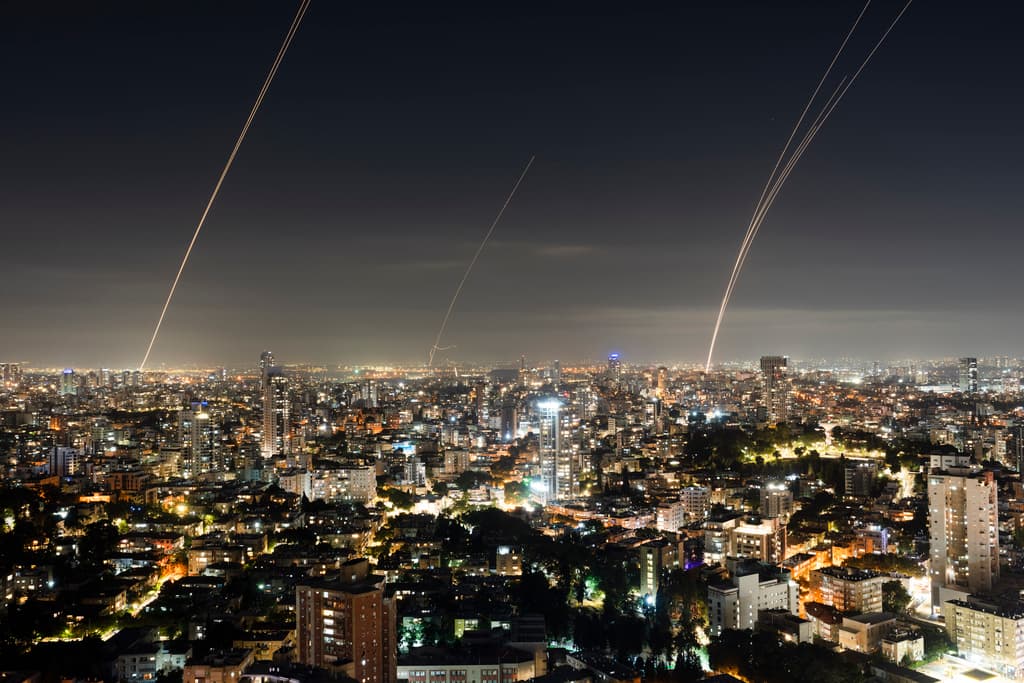With Gaza Cut in Half, Which Hamas May Not Have Seen Coming, Israeli Forces Move In for the Kill
Nearly a month after the Hamas massacres, the IDF tightens its grip on terrorist strongholds in northern Gaza Strip.

Hamas’s terrorist goons probably didn’t see this one coming, but the sliver of Mediterranean territory their rule has ruined steadily over the past 16 years is as of now on a divided strip — because by Monday Israeli soldiers had successfully cut the Gaza Strip in two.
During a press conference on Sunday night, the Israel Defense Forces spokesman, Rear Admiral Daniel Hagari, said, “Today there is north Gaza and south Gaza,” adding that troops led by the Golani Brigade’s reconnaissance unit, which form part of the 36th Division, had “reached the coastline and are holding it.”
The IDF was also striking Hamas terror infrastructure “below ground and above it” on a continuous basis, Admiral Hagari stated, adding that more than “2,500 terrorist targets have been hit in the Strip” since the start of operations in Gaza and that troops were working “to eliminate terrorists in close combat and air strikes on Hamas infrastructure, weapons depots, observation posts and command and control centers in the Strip.”
The IDF is acting to root out Hamas from its mainly underground base of operations in Gaza City through a three-pronged strategy: opening up corridors for the movement of troops, eliminating hidden hives of resistance, and creating temporary outposts — and all of this is occurring inside the Gaza Strip, which it can be said is now the hottest war zone on the planet.
Underscoring the degree to which Israel is undaunted by the challenges at hand, the IDF’s chief of staff, Lieutenant General Herzi Halevi, made on Saturday a surprise visit to Israeli troops inside the Gaza Strip. The lieutenant general’s presence in the Strip likely telegraphed a message to Hamas leadership that their time is running out. Last week, speaking at an Israeli air force base, he said that Israeli forces were “in the heart of northern Gaza, operating in Gaza City, surrounding it.”
While the slender Gaza Strip is no more than seven and a half miles wide at its widest, splitting it in two has not been possible without elbow grease and pluck. According to satellite imagery, Israel has used bulldozers to open pathways across the rolling, sandy territory and clear the way of explosives. Those are accompanied by tanks to give protection for armored vehicles with infantry. Risks can be minimized but not totally eliminated: Last week a Namer armored personnel carrier was struck by two anti-tank missiles, killing all the soldiers inside.
As Israeli columns close in on Gaza City from all sides, the noose tightens on Hamas’s command centers but the dangers to Israeli troops multiply. Hamas still has the hometown advantage when it comes to manning their hideouts amid dense warrens of buildings and navigating their terror tunnels.
Israel has learned lessons from previous incursions into Gaza, and is better prepared than ever before. According to a report in Haaretz, some of the armored vehicles contain medical teams and mobile intensive care units.
In the meantime, army engineers have been building up earthen ramparts to create provisional encampments that can house military vehicles and soldiers, with the walls serving a shield function. Palestinian media outlets have reported that the strategy is to establish secure connections between these positions, with the goal to solidify the division between north and south and effectively seal off Gaza City.
That is where the toughest fighting is expected to occur, as it will pit IDF troops and the restive, surviving members of Hamas’s al-Qassam Brigades.
As Israeli forces work to knock out Hamas tunnels from above ground, the terrorists still have a good measure of mobility underground, and like hornets dislodged from their nests are trying to sting the Israelis with RPG rockets aimed at close range at armored vehicles. This terror tactic has caused some Israeli casualties.
In the meantime the bifurcated Strip is buckling under continuous bombardment. Telephone and internet communications were again disrupted on Sunday and many inhabitants in the northern combat zone were fleeing to the southern section, closer to the Egyptian border. Already 800,000 Gazans have reportedly headed to the south so far.
Hamas terrorists managed to fire a salvo of rockets toward Tel Aviv and throughout the central area of Israel on Sunday, but the Iron Dome appeared to knock them out before they hit the ground. There were no casualties reported. On Saturday they fired a long-range Ayyash 250 missile toward the Israeli Red Sea resort city of Eilat, but that projectile was intercepted by the Arrow air defense system.
Overnight ground troops captured a Hamas stronghold and Israeli forces struck a reported 450 Hamas terrorist sites. From the Mediterranean, the Israeli navy carried out more strikes against Hamas sites, including command centers and anti-tank guided missile launch positions.
The IDF reported that an airstrike successfully neutralized the head of Hamas’s special operations, Jamal Musa. Israeli troops killed an unspecified number of Hamas field commanders in ground battles.
Fierce hand-to-hand combat in and around Gaza City can be expected to continue in the coming days. Tensions are high on the northern Lebanese border and world leaders try to keep the pressure on Hamas to release hostages and scramble to prevent the war from escalating into a wider regional conflagration.

